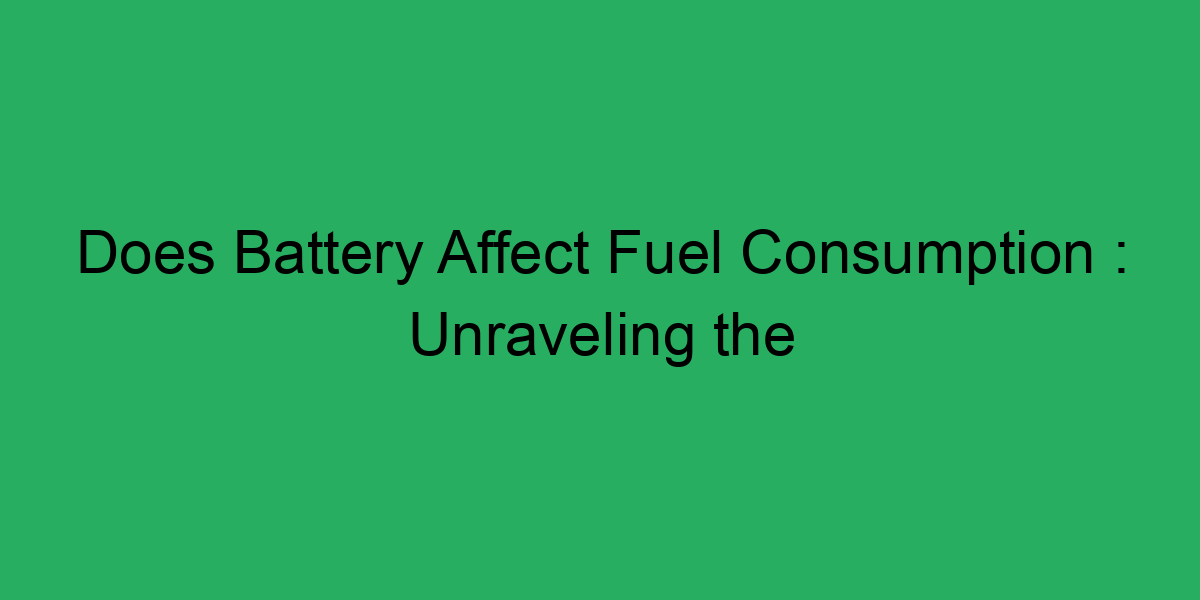Did you know that a weak or dead car battery can subtly yet significantly impact your vehicle’s fuel consumption? It might seem surprising, but the health of your car’s battery plays a more critical role in fuel efficiency than you might think. In this article, we will delve into how a battery affects fuel consumption, the key mechanisms involved, and what you can do to maintain optimal fuel efficiency.
Contents
Key Takeaways
- A weak or dead battery can lead to increased fuel consumption due to the alternator working harder.
- Inefficient fuel injection and combustion can result from a poorly performing battery.
- The car’s computer system and accessories are affected, leading to potential mismanagement of fuel usage.
- Regular battery maintenance is crucial for maintaining fuel efficiency.
- A healthy battery is essential for the proper functioning of automatic start-stop systems.
How a Battery Affects Fuel Consumption
The Role of the Battery and Alternator
A car battery is not just about starting the engine; it also powers various electrical components and acts as a reserve power source when the alternator cannot meet the demand. When the battery is weak or failing, the alternator has to work harder to keep it charged. This increased workload on the alternator means the engine has to consume more fuel to generate the necessary electricity.
Impact on Fuel Injection and Combustion
A weak battery can disrupt the efficient operation of fuel injectors. Fuel injectors rely on stable electrical power to inject fuel into the cylinders accurately. If the battery is not providing the required voltage, the fuel injectors may not function optimally, leading to less efficient fuel combustion and a decrease in fuel economy.
Effect on the Car’s Computer System and Accessories
The car’s computer system, including the Powertrain Control Module (PCM), relies on stable electrical power from the battery. A weak battery can lead to inaccurate readings from various sensors, such as oxygen and exhaust gas sensors, which are crucial for managing fuel consumption. This can result in the engine using more fuel than necessary without the driver being aware of it.
Increased Demand on Other Parts
When a battery is weak, it places additional strain on other components of the vehicle. The alternator, for instance, may run non-stop to try and recharge the battery, which can lead to a slight but noticeable decrease in fuel efficiency. Over time, this can also shorten the life of the alternator and other related components.
Products to Improve Your Experience
To ensure your car’s battery health and maintain optimal fuel efficiency, consider investing in a high-quality battery and a reliable battery tester.
- High-Quality Battery: Look for batteries from reputable manufacturers that are designed for your vehicle’s specific needs. For example, the Continental AGM Battery is known for its durability and performance.
- Battery Tester: A battery tester like the Midtronics Battery Tester can help you diagnose battery health accurately and prevent unexpected failures.
Examples and Applications
Real-World Case Study
A driver noticed a significant drop in fuel mileage when their car battery started to fail. After replacing the battery, the fuel mileage improved from 28-29 mpg to 32-34 mpg. This case illustrates how a weak battery can directly impact fuel efficiency and how maintaining a healthy battery can restore optimal performance.
Practical Application
Regularly check your car’s battery health, especially if you notice symptoms like slow engine starts or dim headlights. Use a battery tester to assess the battery’s condition and replace it if necessary. This proactive approach can help you avoid decreased fuel efficiency and other related issues.
The Bottom Line
Maintaining a healthy car battery is crucial for ensuring your vehicle runs efficiently and consumes fuel optimally. By understanding the impact of a weak or dead battery on fuel consumption, you can take proactive steps to check and maintain your battery regularly. This not only saves you money on fuel but also contributes to a more environmentally friendly driving experience.
So, the next time you notice a dip in your car’s fuel efficiency, don’t overlook the health of your battery. Check it, maintain it, and enjoy the benefits of a more fuel-efficient ride.

Hi, I’m Sufiyan, the developer behind this platform. I created FuelConsumptionCalculator.com to simplify fuel tracking for everyone — because understanding your vehicle shouldn’t require a degree in mechanics. I’m always working on adding more tools and content to make this site even more useful

